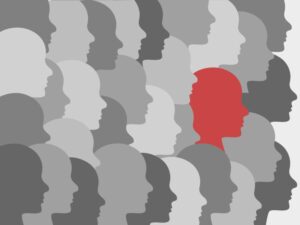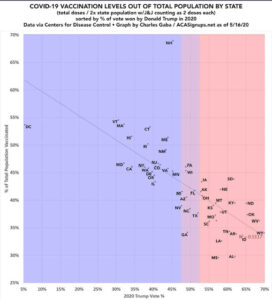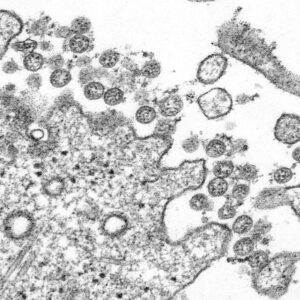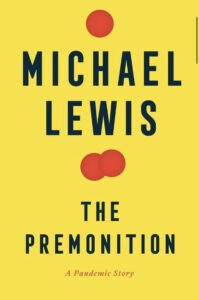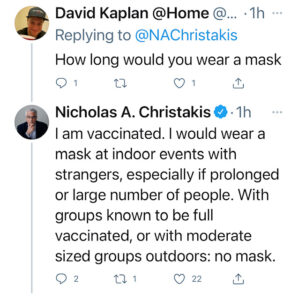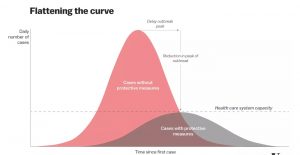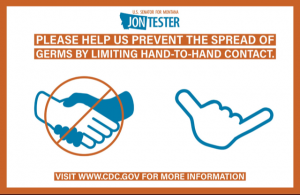CDC
ˈtrəst
May 18, 2021Washington Post
| The new mask rules from the C.D.C. amount to an honor system of sorts, where only unvaccinated people are expected to keep wearing masks in most places. But many Americans are wondering whether they can trust others to do the right thing. |
| In social psychology, there’s a well-established principle that a common enemy is supposed to bring people together. But shortly after the pandemic arrived, the U.S. saw a partisan divide over masks, screaming crowds outside state capitols and death threats against health officials. |
| It quickly became apparent that, even in a crisis, Americans were finding it difficult to come together. So it’s no wonder that the federal government’s new mask guidance has been greeted with reluctance — especially when fewer than half of Americans over 12 are fully vaccinated. |
| Celeste, a newsletter reader from Dayton, Ohio, wrote in with her own experience. |
| “The first day of The Great Unmasking at work went exactly as you’d expect: people who have previously bragged about not being vaccinated walking around without masks on,” she wrote. “Assuming people would act unselfishly to protect others goes against everything we’ve seen so far this pandemic.” |
| The C.D.C. is also asking Americans to trust one another at a time when faith in institutions and their neighbors is particularly fragile. According to a 2019 Pew Research Center report on Trust and Distrust in America, trust in the federal government was near record lows, and seven in 10 people said they thought that Americans’ trust in one another had declined over the past 20 years. |
“Betrayal is the wound that cuts the deepest.”
Boise State Public Radio
Most people in the Mountain West are still unvaccinated. Idaho has the second-lowest rate in the region with only 34% of its residents getting one or more doses.
COVID-19 vaccine supplies are now abundant – nationally about 60% of adults have had at least one shot.
“At least here in Casper, (Wyo.), you can go to the clinic and pick one of the three vaccines. It’s like a menu: I want Moderna, I want Pfizer, I want Johnson & Johnson. We have that much vaccine now,” said Mark Dowell, an infectious diseases physician and Natrona County health officer.
Even so, most people in the Mountain West are still unvaccinated. And Wyoming has the region’s lowest vaccination rate with about a third of residents with at least one shot. Idaho is a close second at about 34% of its residents with one or more doses.
To achieve herd immunity, epidemiologists have suggested we need about 70% of people to be immune, though that number is hard to pin down without more research.
Dowell said we also don’t know how many people actually were infected with COVID-19, how many of those built up antibodies, and how long those antibodies might last.
“We think that for every one infection, there may have been one or two more that had symptoms that went undetected,” he said.
Even if we could figure out how many were infected, he said we still have one big unanswered question: “Of the people that had the infection but didn’t know it, did they get good protection from their immune system to add to our herd immunity?”
We also don’t know how long the vaccines will stave off the virus, though many expect them to offer protection for at least a year.
Dowell says it could take several months to figure out how much of the virus we’ve stopped, saying, “The proof of the pudding will be next fall and winter when everybody’s inside again.”
At the same time, areas with low rates of immunity and high rates of spread could allow the virus to mutate into a more dangerous strain.
“That’s another reason to get vaccinated, to head off the mutations,” he said. “The worry is that you’ll find a variant eventually that will not really be covered by the vaccines.”
Dowell said he is continually talking to patients who believe in false conspiracy theories about the vaccine, ranging from it causing infertility to vaccines actually being tracking microchips from Bill Gates. At the same time, he still hopes he can convince more people to get it.
“When you’ve seen people die horrible deaths from COVID, it changes your perspective on things,” he said. “I had a close, healthy friend that died of COVID way before we had the vaccines. And it was a rough death. I sat at his bedside as he died, as we took him off the ventilator … it’s rough.”
Guest essay on why novelty means severity, and why so many questions about variants, children, Long Covid, endemicity and more revolve around that very notion by Dylan Morris, PhD.
. Nothing in this pandemic makes sense except in the light of novelty.
‘…wealthy countries have two choices for how the global pandemic ends: via natural infection or via vaccination. We should choose vaccination.’
‘Remembering that novelty means severity helps us see that the vaccines provide cause for hope, even if SARS-CoV-2 manages to stay with us for years. SARS-CoV-2 might stick around; the COVID-19 pandemic will struggle to do so.
But it also makes clear that those of us in wealthy countries have two choices for how the global pandemic ends: via natural infection or via vaccination. We should choose vaccination. And we must commit to that choice now. We don’t have much time.’
https://www.theinsight.org/p/novelty-means-severity-the-key-to
I continue to think where we’d be as a country right now with this pandemic if it had not been allowed, and encouraged, to become political. Hundreds of thousands did not need to die. -dayle
“One day some historian will look back and say how remarkable it was that these strange folk who called themselves ‘Americans’ governed themselves at all, given how they went about it.” -Michael Lewis [p.78.]

While many people happily shed their masks and celebrated the apparent end of the pandemic, others are concerned that with only 37 percent of the country fully vaccinated, this relaxation is premature and could lead to a resurgence of infections
The CDC’s mask guidance is a mess. Biden needs to clean it up.
This was an astounding strategic and tactical mistake. It will have lasting repercussions unless the White House steps in to clean up the CDC’s mess. As a start, the administration should clarify that while vaccinated people are generally not at risk, the unvaccinated are still at high risk. Therefore, if there is no reliable way to verify vaccination status, indoor mask mandates must still remain in place.
“We do not have enough vaccinated; we are seeing frequent emergence of new variants[…]Relaxing NPIs (masks/distancing) before adequate vaccine coverage could result in tremendous loss of potentially averted cases, hospitalizations & mortality.” -Dr. David Pate, Idaho Covid Task Force
Please. Just a little while longer.
This is the only herd we’re going to have if you don’t vaccinate.
?
March 20, 2020
|
|
|
Dayle, Our country is staring down the most difficult challenge we have faced since World War II. The coronavirus crisis poses a real threat to our health and economy, and requires a strong response — from our government, but also from each of us. It’s natural to feel overwhelmed or powerless at a time like this, but we all have the power to help slow the spread of the coronavirus by taking simple steps. Here are a few pieces of guidance the CDC is giving right now:
Keep an eye out for more updates from the CDC and from your state and local health departments for updated guidance. Even if you’re young and healthy, it is critical that you take all of these steps because they help protect the rest of your community. You’ll reduce the risk of unknowingly passing on the disease to someone else — someone older and less healthy than you who might become seriously ill if they contract the coronavirus. Think of the grandparents, cancer patients, and others out there who are counting on you to help keep them safe. Do everything you can to follow these guidelines and take care of yourself. And if you’re able, please take care of your friends, your family, your neighbors, and anyone around you who might need a little extra help — pick up groceries for an older neighbor or order takeout from a local restaurant that is struggling. But “social distance” doesn’t mean we should stop communicating. We need one another now more than ever. Keep checking in on people — texting, emailing, calling, video chatting, whatever works, and whatever keeps you talking with the people who make you strong. If we all take this seriously, we can limit the number of people who get sick all at the same time, and make it easier for our health system to deliver care to everyone who needs it. Taking action as individuals and as local communities is critical, but of course it’s not enough. Our government needs to step up and treat the coronavirus as the public health and economic crisis that it is. I’ve outlined an updated plan to do exactly that, including:
I’ll keep fighting in Washington to make sure our government takes this pandemic seriously and doesn’t use it as a giveaway to big companies that leaves everyday people behind. The Trump administration failed to prepare us for this pandemic. It’s more important than ever for us to each do our part as citizens to support one another. Now, I wish I could tell you that this crisis will be over by “X” date or within “Y” days. But the reality is we just don’t know. For a while, it’s going to be hard. For a lot of people, it’s going to be really hard. But it won’t last forever. And we do know this: When we look out for each other, we make each other stronger. We get through times like these when we fight side by side. Elizabeth |
#FlattenTheCurve
March 10, 2020“Difficult problems are rarely solved immediately, and sometimes they’re not solved the way we might have imagined, but with effort, they often yield.” Seth Godin
“Someone made a really good point–many Americans are all about their “self-rights” rather than thinking of others. Look at vaccine fiasco. A wealthy family in St. Louis that was suppose to quarantine went to dad-daughter dance , shopping, and nail salon.” Ed Fuller, Associate Professor at Penn State
Epidemiologists call this strategy of preventing a huge spike in cases “flattening the curve,” and it looks like this:
VOX
According to infectious disease epidemiologist Marc Lipsitch at Harvard, it’s “plausible” that 20 to 60 percent of adults will be infected with Covid-19 disease. So far, 80 percent of cases globally have been mild, but if the case fatality rate is around 1 percent (which several experts say it may be), a scenario is possible of tens or hundreds of thousands of deaths in the US alone.
On Thursday, the CDC posted new guidance for people over age 60 and people with chronic medical conditions — the two groups considered most vulnerable to severe pneumonia from Covid-19 — to “avoid crowds as much as possible.”
At this point, with the virus spreading in America, the top priority is making sure the health care system avoids being flooded with very sick patients who need ventilators and intensive care.
But one thing people can do to help is stay home if they are feeling unwell and especially if they received a formal Covid-19 diagnosis and advice to self-quarantine. That way, the US health care system can focus on the patients who really need it during this outbreak.
Washington Post
“Two weeks of delay can mean the difference between success and failure. Public health experts learned this in 1918 when the Spanish flu killed 50 million to 100 million people around the globe. If we fail to take action, we will watch our health-care system be overwhelmed.
Because children are not among the groups most vulnerable to coronavirus, schools should be closed in an effort to reduce community transmission and to protect the children’s parents and grandparents. How long? Epidemiologists suggest eight weeks might be needed to arrest this outbreak.”
The United States and other liberal societies must mount a significant, coordinated response with public buy-in.
As the coronavirus shifts from containment to mitigation, I am finally able to engage my two superpowers — social distancing and self-quarantine. -Cynthia Sewell, Investigative Reporter for the Idaho Statesman
“The intersection of a complex, unexpected health crisis causing an unusual form of recession is exactly the kind of thing Elizabeth Warren would’ve been unusually good at handling.” -Journalist Ezra Klein

